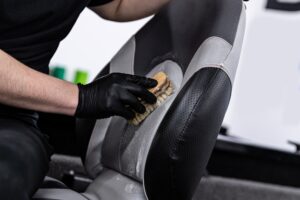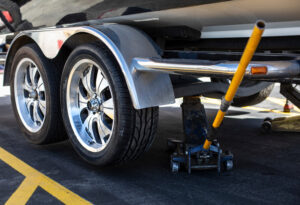With fall approaching the time to start prepping and storing your boat for the upcoming season is now. Why store your boat? There are plenty of reasons, some of these being to protect it from weather and theft. As well allow you convenient access to work on it, and to avoid possible environmental mishaps such as leaks or debris. Don’t be caught dead in the water, follow these tips to help properly preserve your boat during the winter months.

Inspect Your Boat
Giving your boat a good walk around and looking for any possible repairs is a must before storing. Inspect your boat from bow to stern, checking for holes or punctures to your boat’s underside, leaks in your fuel or water lines, and scanning the propeller, pumps, anchor, etc. to make sure they are in sound mechanical condition. Checking these items off your list before storing will be much easier than trying to rush repairs next spring.
Clean Your Boat
Washing your boat has multiple benefits, such as keeping your boat looking good, protecting the integrity and structure of the boat, preventing water pollution, and allowing your boat to perform at its peak ability. When cleaning your boat everything should be scrubbed, including the exterior, interior, seats, accessories, windows, life jackets, etc. Lastly, make sure your boat has time to dry after a good wash, open all drain plugs and allow your boat to air out, this will help prevent mold and mildew from growing as your boat is in storage.
Check Electrical Connections
Disconnect all electronics to avoid any shortages, electrical fires, or the draining of your marine battery. Starting from the front of your boat and working back, check electrical lines, gauges, depth finders, radios, and any other appliance that could cause an issue. Checking electrical systems is even more important if you’re storing your boat indoors.

Check Your Boats Fluids
Go through all your boat’s fluids to help reduce the risk of corrosion and deterioration. Some fluids that should be changed are the oil, anti-freeze, transmission fluid, and gas. Along with these fluids you may need to replace the oil filter, flush the old anti-freeze, and replace it with new, and add fuel stabilizer to the gas, making sure the gas doesn’t go “stale” over the duration of storage.
Properly Cover
Cover your boat with a tarp, cloth cover, or shrink wrap to protect against moisture, mildew, dust, and debris. When protecting your boat use a tight-fitting cover to seal it, you don’t want anything finding its way in your boat that could cause damage.
Don’t Forget the Accessories
Store life jackets, flags, cushions, and canopies indoors to avoid potential weathering and damage. This also includes checking your boat trailer, it’s tires, hitch, brake lights, and loading guides.

Contact Cross Insurance today for a boat insurance quote, let us help finish protecting your boat by discussing your coverage options.
___________________________________________________________________
This article is for general informational purposes only and is not to be relied upon or used for any particular purpose. Cross Insurance shall not be held responsible in any way for, and specifically disclaims any liability arising out of or in any way connected to, reliance on or use of any of the information contained in this article. The information contained or referenced in this article is not intended to constitute and should not be considered legal, insurance, accounting or other professional advice, nor shall it serve as a substitute for the recipient obtaining such advice. The views expressed in this article are that of its author and do not necessarily represent the views of Cross Financial Corp. and its subsidiaries and affiliates (“Cross Insurance”) or Cross Insurance’s management or shareholders.


